
Current Atherosclerosis Reports
Scope & Guideline
Advancing knowledge in cardiovascular health.
Introduction
Aims and Scopes
- Atherosclerosis Mechanisms and Pathophysiology:
Research exploring the underlying biological and molecular mechanisms of atherosclerosis, including inflammation, lipid metabolism, and vascular biology. - Clinical Management and Therapeutics:
Focused studies on various treatment modalities for atherosclerosis, including pharmacotherapy, lifestyle interventions, and novel therapeutic approaches such as gene editing and monoclonal antibodies. - Epidemiology and Risk Factors:
Investigations into the epidemiology of cardiovascular diseases, identifying risk factors such as genetics, lifestyle, and social determinants of health. - Pediatric and Adolescent Cardiovascular Health:
Research dedicated to understanding and managing cardiovascular risks in younger populations, including familial hypercholesterolemia and dyslipidemia. - Emerging Technologies in Cardiovascular Research:
Utilization of advanced technologies such as artificial intelligence, machine learning, and digital health innovations to enhance cardiovascular disease prevention and management. - Nutritional and Behavioral Interventions:
Studies that examine the impact of diet, nutrition, and behavioral changes on cardiovascular health, emphasizing the importance of community-based approaches.
Trending and Emerging
- Digital Health and Artificial Intelligence:
Recent publications emphasize the integration of digital health technologies and artificial intelligence in cardiovascular disease prevention and management, reflecting a modern approach to patient care. - Social Determinants of Health:
An increasing number of studies address the impact of social determinants on cardiovascular health, underscoring the need for equitable healthcare solutions and community interventions. - Personalized Medicine and Genomics:
Emerging themes in personalized medicine, including the application of genetic testing and polygenic risk scores, are gaining traction as researchers seek to tailor treatments based on individual risk profiles. - Gut Microbiome and Cardiovascular Disease:
There is a growing interest in the relationship between the gut microbiome and cardiovascular health, exploring how microbial factors may influence atherosclerosis and metabolic disorders. - Mental Health and Cardiovascular Outcomes:
Research linking mental health conditions, such as depression and anxiety, with cardiovascular disease risk is becoming more prevalent, highlighting the importance of holistic approaches to patient care.
Declining or Waning
- Traditional Lipid Management Strategies:
There is a noticeable decrease in papers focusing solely on traditional lipid management strategies, such as statins, as newer therapies and comprehensive approaches gain importance. - Basic Science Studies without Clinical Relevance:
Research that lacks direct clinical applications or relevance to patient care is becoming less frequent, signaling a shift towards studies that bridge laboratory findings with real-world outcomes. - Single Risk Factor Studies:
Research concentrating on isolated cardiovascular risk factors is declining, with a growing emphasis on multifactorial approaches that consider the complex interplay of various risk elements. - Purely Genetic Studies:
While genetics remains a vital area of research, there is a waning interest in studies that do not integrate genetic findings with clinical implications or broader epidemiological perspectives.
Similar Journals
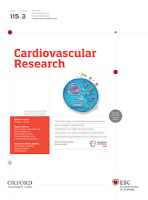
CARDIOVASCULAR RESEARCH
Connecting research to real-world cardiovascular solutions.CARDIOVASCULAR RESEARCH, published by Oxford University Press, is a premier academic journal dedicated to the evolving field of cardiology and cardiovascular medicine. With a remarkable impact factor reflecting its significant contribution to the scientific community, this journal maintains a Q1 ranking in both Cardiology and Physiology categories, demonstrating its commitment to publishing high-quality research that influences clinical practices and healthcare outcomes. Established in 1967, the journal has consistently provided a platform for innovative studies and reviews, aiming to advance our understanding of cardiovascular physiology and pathology. Researchers, professionals, and students will find published articles crucial for their work, as the journal covers a broad spectrum of topics including molecular biology, genetics, and clinical studies. While currently not offering open access options, CARDIOVASCULAR RESEARCH remains accessible through institutional and individual subscriptions, ensuring that the latest findings are available to those in the cardiovascular science community.

Acta Cardiologica Sinica
Connecting Researchers for a Stronger Cardiac Future.Acta Cardiologica Sinica is a distinguished journal dedicated to the advancement of cardiology and cardiovascular medicine, published by the Taiwan Society of Cardiology. Since its inception in 1988, this journal has provided a platform for researchers and clinicians to share cutting-edge findings and insights into cardiac health, cardiovascular diseases, and innovative treatment strategies. With an impressive Q3 classification in the Cardiology category for 2023, the journal is recognized for its contributions to the field, ranked #208 out of 387 in Scopus, placing it within the 46th percentile of medical journals. Although it currently does not offer open access options, it remains a valued resource for the global cardiovascular community. The journal's commitment to disseminating high-quality research papers, reviews, and case studies ensures that it plays a vital role in improving cardiovascular health practices and outcomes. For researchers, professionals, and students alike, Acta Cardiologica Sinica is essential reading for staying informed about the latest developments in cardiology.
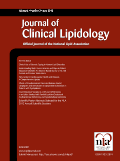
Journal of Clinical Lipidology
Exploring the intricate links between lipids and chronic diseases.Journal of Clinical Lipidology, published by Elsevier Science Inc, is a leading platform dedicated to advancing the understanding of lipidology and its impact on cardiovascular health. With an ISSN of 1933-2874 and E-ISSN 1876-4789, this esteemed journal boasts a remarkable Q1 ranking in key medical categories, including Cardiology and Cardiovascular Medicine, Internal Medicine, and Nutrition and Dietetics, solidifying its position as a vital resource for the latest research and clinical practices. This journal not only serves as a repository for groundbreaking studies but also provides insights into complex interactions between lipid metabolism and chronic diseases, including diabetes and obesity. Researchers, practitioners, and students will find a wealth of carefully vetted articles that drive innovation and improve patient outcomes in lipid management. Although it does not currently offer open access, the Journal of Clinical Lipidology ensures high visibility through rigorous peer review and a commitment to quality, making it an essential read for anyone invested in the future of lipidology.

International Journal of Cardiology Cardiovascular Risk and Prevention
Innovating Strategies for Cardiovascular HealthInternational Journal of Cardiology Cardiovascular Risk and Prevention is a distinguished Open Access journal published by ELSEVIER, dedicated to advancing research in the realms of cardiology and cardiovascular medicine. With an ISSN of 2772-4875 and based in the Netherlands, this journal has rapidly established itself as a critical resource for academics and practitioners since its inception in 2021. The journal currently holds a respectable impact factor and occupies the Q2 quartile in both Cardiology and Cardiovascular Medicine and Internal Medicine categories, reflecting its commitment to sharing high-quality research. Researchers can take advantage of its open-access model, ensuring that cutting-edge findings are freely available to a global audience. The journal not only covers innovative studies on cardiovascular risk factors and prevention strategies but also aims to facilitate interdisciplinary collaboration. With an ongoing trajectory from 2021 to 2024, the International Journal of Cardiology Cardiovascular Risk and Prevention is poised to remain a pivotal platform for dialogue and discovery in the evolving landscape of cardiovascular health.

International Journal of Angiology
Exploring innovative insights in angiology and cardiology.Welcome to the International Journal of Angiology, a distinguished publication dedicated to advancing the field of cardiology and cardiovascular medicine. Published by THIEME MEDICAL PUBL INC, this journal plays a crucial role in disseminating innovative research and clinical insights from 1992 through 2024, serving as a vital resource for researchers, healthcare professionals, and students alike. With an ISSN of 1061-1711 and an E-ISSN of 1615-5939, the journal currently holds a respectable Q4 ranking in the cardiology field, reflecting its commitment to quality and relevance. Although it operates under a traditional access model, the journal ensures that critical research findings are shared with a broad audience, fostering collaboration and knowledge exchange. By exploring current trends, diagnostic techniques, and treatment modalities in angiology, the International Journal of Angiology remains an essential platform for those dedicated to improving cardiovascular health around the globe.
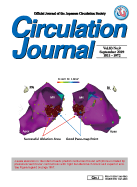
CIRCULATION JOURNAL
Connecting Global Insights in Cardiology and Medicine.CIRCULATION JOURNAL, published by the Japanese Circulation Society, stands as a premier platform for cutting-edge research in the fields of Cardiology and Cardiovascular Medicine. With an impressive impact factor placing it in the Q1 quartile for both cardiology and general medicine, this journal is essential for researchers and practitioners seeking to stay at the forefront of cardiovascular science. The journal's accessible open access options ensure that groundbreaking studies are widely disseminated, reflecting its commitment to advancing medical knowledge and improving patient care. Since its inception in 1996, CIRCULATION JOURNAL has fostered a global dialogue on vital cardiovascular issues, making it a vital resource for academics, healthcare professionals, and students alike. With its base in Tokyo, Japan, the journal not only highlights regional advancements but also contributes significantly to the global medical community.
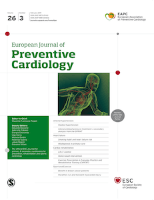
European Journal of Preventive Cardiology
Advancing cardiovascular health through innovative research.The European Journal of Preventive Cardiology, published by Oxford University Press, is a leading international journal dedicated to the field of cardiology and cardiovascular medicine. With an impact factor that underscores its prestige—ranking in the top quartile (Q1) of both cardiology and epidemiology categories—the journal serves as a critical resource for researchers and practitioners seeking to advance their understanding of preventive strategies in cardiovascular health. Since its inception in 1999, it has provided a platform for high-quality research and reviews that address the epidemiology of cardiovascular diseases, risk factor management, and innovative prevention methodologies. Notably, it currently ranks #21 out of 387 in Medicine - Cardiology and #13 out of 148 in Medicine - Epidemiology according to Scopus, highlighting its influential position in these essential biomedical fields. The journal also provides open access options, allowing both readers and authors the opportunity to engage with groundbreaking research and enhance the dissemination of knowledge. With a commitment to excellence, the European Journal of Preventive Cardiology is an invaluable asset for those dedicated to the prevention of cardiovascular diseases.
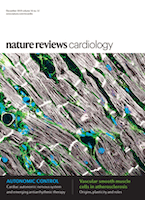
Nature Reviews Cardiology
Exploring the Frontiers of Cardiovascular ScienceNature Reviews Cardiology, published by NATURE PORTFOLIO, stands as a premier academic journal in the field of cardiology and cardiovascular medicine, boasting an impressive impact factor and a distinguished ranking of #1 out of 387 in Scopus. Since its inception in 2009, this exemplary journal has continuously delivered cutting-edge reviews and insights, supporting researchers, healthcare professionals, and students in navigating the complex landscape of cardiovascular health. With a commitment to providing open access and disseminating rigorous research, Nature Reviews Cardiology captures the forefront of innovation and scholarship, critical for facilitating advancements in cardiovascular science and clinical practice. Situated in the United Kingdom and with a vibrant global readership, this journal perpetuates academic excellence, ensuring accessibility to the latest findings that shape prevention, diagnosis, and treatment strategies in cardiology through to 2024 and beyond.

VASCULAR MEDICINE
Advancing cardiovascular health through impactful research.Vascular Medicine is a premier academic journal for researchers and practitioners in the field of cardiovascular health, published by SAGE Publications Ltd. With an ISSN of 1358-863X and E-ISSN 1477-0377, this esteemed journal has been at the forefront of publishing quality research since its inception in 1992, with convergence extending to 2024. Ranked in the Q2 category for both Cardiology and Cardiovascular Medicine as well as for miscellaneous Medicine in 2023, it is recognized for its significant contributions to advancing knowledge and clinical practice within these domains. Its Scopus ranking situates it at #91 out of 387 in the field, reflecting its high impact and the relevance of its published research, which is crucial for addressing the challenges in vascular health today. Although it is not an open-access journal, Vascular Medicine remains dedicated to disseminating vital findings that bridge the gap between research and clinical application, making it an essential resource for medical researchers, healthcare professionals, and students alike.

Journal of Atherosclerosis and Thrombosis
Exploring breakthroughs in atherosclerosis and thrombosis research.Journal of Atherosclerosis and Thrombosis is a leading academic publication dedicated to advancing research in the fields of cardiovascular medicine, biochemistry, and internal medicine. Published by the Japan Atherosclerosis Society, this esteemed journal operates from its headquarters in Tokyo, Japan, and has been a vital resource in its area since its inception in 1994. With its robust impact in Cardiology and Cardiovascular Medicine, ranking in the top quartile (Q1) as of 2023, and a commendable standing in Internal Medicine and Biochemistry, the journal fosters an environment of innovation and discovery, showcasing significant studies and advancements that shape clinical practices and therapeutic approaches. Though not an open-access publication, it offers a wealth of insights to researchers, professionals, and students seeking to deepen their understanding of atherosclerosis and thrombosis. By continually featuring high-quality articles, the Journal of Atherosclerosis and Thrombosis plays an essential role in bridging the gap between research and practice, facilitating critical conversations that influence the future of cardiovascular health.